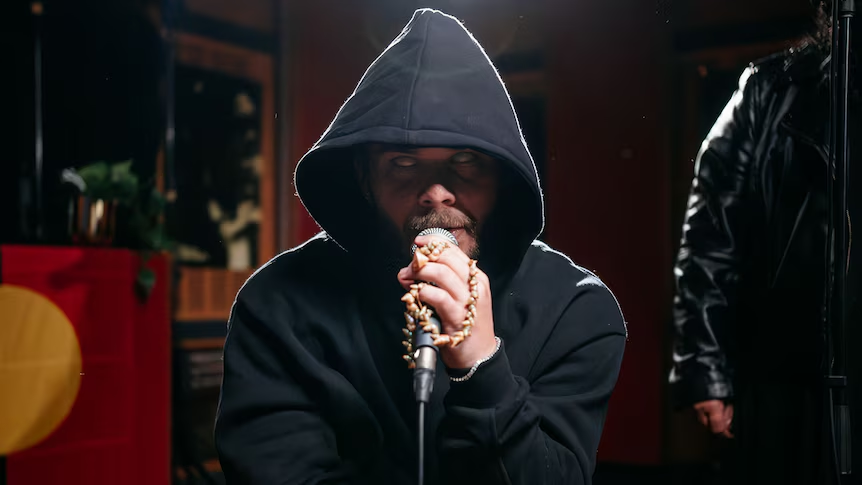BACK TO BACK CLASSICS
Words by Will Brussen
Having already created a name for himself as a rapper unafraid to experiment and not limited by genre or style. Gumbaynggirr rapper Tasman Keith looks within and returns with his most personal track to date “70 Somethin’” accompanied by his incendiary triple j like a version cover of Outkast’s “B.O.B- Bombs Over Baghdad”.
“70 Somethin’” opens with the minimal and repetitive isolated piano keys giving way for Tasman’s vocals to take centre stage, as he tells the story of his Uncle NUTZ. “He was born in 70 somethin’, spent life inside a wall. I heard about him through my older brother, I was 4. I heard about him through my father talking about his cause and how his older cousin made a name within those prison walls, Uncle NUTZ. Reason for the name ain’t give a fuck, I heard he killed a man, I heard a bill of things. I heard enough”. When this opening verse ends with “I heard enough”, it works to amplify the pain and hurt that runs through the track which is matched with a deep vulnerability, making for a truly powerful moment. The first verse sets the scene of Uncle NUTZ story, the second explores Tasman’s father Wire MC who had a different trajectory then the third verse explores what Tasman would have done if he was born in the position of his uncle.
Sometimes we can’t blame the actions of a person when the system is to blame, and that’s why structural change is needed if there is ever to be personal change. This is an intensely personal song about how the over incarceration of First Nations people in so called Australia impacts people. First Nations people are significantly overrepresented in the prison population with figures ranging from over 30% to 40% depending on state and even higher in youth detention whilst only making up 3% of this country’s overall population. There are structural issues that need to change for this issue to ever change, but what is known is that lives are hurt as a result of the racism and over-policing of First Nations people in this country. This song gives insight that this isn’t just a political issue but what incarceration and institutionalisation can feel like for families impacted by it. This shows that what is thrown around like a political football, with rhetoric of “being tough on crime” but not on rehabilitation, is the personal impact that this has on families. Like the echoes of the past that reverberate so too does intergenerational trauma though this is a legacy of continuing settler colonialism whilst intergenerational healing looks like the freedom of all people.
As the track continues the piano line lifts and the hurt being expressed gives way to a feeling of defiant hope. You can feel the shift when Tasman professes, “when I say my free my people, I say free us all from chains”. Backing this is the sound of clapsticks and yidaki as the track stirs with ancestral spirit coming into the fold, it turns from looking inwards on his family experiences to looking outward to when will there ever be change.

Tasman’s like a version cover of Outkast’s “B.O.B- Bombs Over Baghdad” works as an accompanying piece to “70 Somethin’” as a rallying call for freedom and liberation. From the pain and grief of “70 Somethin’” it opens up to the need for resistance and ongoing fight that never gives up but only gets stronger. Communities come together when they hurt, when there is unnecessary black deaths in custody and a genocide taking place on our phone screens. Talking to triple j about the like a version, Tasman shared “For me, just with a lot going on right now here and everywhere, it just felt like what I needed and what I wanted to say in the moment” He adds, “And also to be able to pen a verse after an Andre 3000 verse is a challenge, and I wanted to take that on.”
Tasman takes the Outkast original in a completely different direction whilst still retaining the essence of the original. An opening verse that continues where Andre 3000’s left off in the original song which calls for freedom of his people and all people. The choir backing Tasman serves to elevate the moment, there’s a nice symbolism of coming together as Tasman explains that the choir was made up of “mob from different parts… share this moment together”. Starting with the call and response and then coming in on different parts of the song, serving to not be overpowering but rather empowering because we know we are stronger together and that we always bring the strength of our communities with us. The song builds till it’s a pure display of blak joy with the vocals of the choir and the yidaki backing Tasman.
“70 Somethin’” is a personal tale that resonates for many, whilst there is pain and grief in the music, it emanates with strength and resilience. Tasman shows that he has the strength of his lineage which he channels through in his music. Paired with his cover of “B.O.B- Bomb’s Over Baghdad” it’s a call for resistance, for change and an expression of blak joy.



